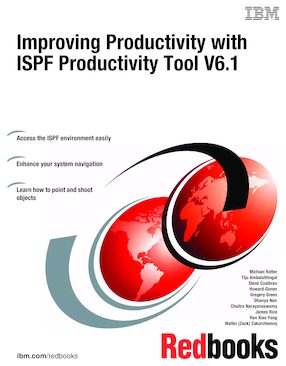Improving Productivity with ISPF Productivity Tool V6.1
An IBM Redbooks publication
Note: This is publication is now archived. For reference only.

Published on 26 August 2009
ISBN-10: 0738433292
ISBN-13: 9780738433295
IBM Form #: SG24-7710-00
Authors: Rotter Michael, Tiju Ambalathingal, Steve Coalbran, Howard Givner, Gregery Green, Dhanya Nair, Chaitra Narayanaswamy, James Rice, Ren Xiao Yang and Walter (Zack) Zakorchemny
This IBM® Redbooks publication introduces the Interactive System Productivity Facility (ISPF) Productivity Tool (IPT) Version 6, Release 1 for z/OS®. IPT operates as a seamlessly integrated front end to ISPF.
IPT functionality is available from any panel without a need to modify any ISPF Primary Options Menu. All IPT functions are totally integrated. IPT can perform almost any activity within ISPF, or internally invoke the function that can perform the task.
IPT combines separately provided ISPF utility functions and new ISPF Productivity Tool features into the Object List (OLIST) and Member Selection List (MSL). The resulting member, dataset, and object lists become powerful platforms where you can perform many tasks without navigating to other utilities.
IPT relates objects to applications in a similar manner to the way that a PC performs Object Linking and Embedding (OLE). By extending the dataset objects that are used by ISPF to other object classes, IPT lets you specify the object to be processed and the action that is performed (such as EDIT or BROWSE). The facility that is appropriate to the object class for the action that you have requested is invoked automatically.
IPT provides extensive search capabilities that are both rapid and intuitive. You can easily search for volumes, datasets, members, and text within members. ISPF Productivity Tool also furnishes automatic drill-down system navigation to examine volumes, datasets, and members.
IPT provides a menu-driven facility to display and recover all of the deleted members of a partitioned dataset (PDS) library.
IPT extends the ISPF Action Bar with options that provide access to new functionality so that you do not have to learn new commands or syntax. In addition to the ISPF point-and-shoot capabilities, IPT provides new concepts, such as hotbars (user-defined fields that execute commands), field-sensitive areas in MSLs and OLISTs, automatic recognition of a dataset name on any ISPF panel as a parameter to BROWSE, EDIT, or VIEW, or parameters within any Time Sharing Option (TSO) command.
IPT provides integrated and enhanced IBM Software Configuration and Library Manager (SCLM) support within the standard member and dataset lists. SCLM is a source library management component of ISPF that provides change control, multiple source versions, auditing, a built-in make facility, and automatic check-in/sign-out using standard libraries (PDS and partitioned dataset extended (PDSE)). IPT includes built-in interfaces to various IBM and ISV products.
This book is intended as a supplement to existing product manuals. It starts with an overview of the main IPT concepts and facilities. It then follows with detailed chapters, each dedicated to a major IPT function, such as:
Object lists
Member selection lists
Enhanced point-and-shoot
EDIT CUT and PASTE
IPT with IBM FileManager
IPT with IBM SCLM
TSO Shell
IPT installation and customization
An example of implementing an IPT user defined object list
An appendix explores selected topics.
Practical scenarios, accompanied by detailed screen captures and coding examples, demonstrate how to take advantage of the IPT enhanced functionality in every case. This book is intended for anyone who wants to learn more about IPT.
Chapter 1. Introduction to the ISPF Productivity Tool
Chapter 2. Object Lists
Chapter 3. Member Selection Lists
Chapter 4. TSO Command Shell
Chapter 5. IPT Global Commands
Chapter 6. Invoking IPT from ISPF Option 3.4
Chapter 7. Enhanced cut and paste
Chapter 8. Using IBM File Manager for z/OS with IPT
Chapter 9. IPT customization: First-time logon
Chapter 10. Customizing your ISPF keys for Point-and-Shoot
Chapter 11. Installing IPT V6.1 on z/OS
Chapter 12. IPT user customization using the IPT SET command
Chapter 13. SCLM integration with IPT
Chapter 14. IPT double-byte character set support
Appendix A. Customizing IBM Personal Communications